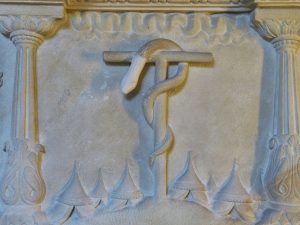The concept of idolatry has evolved and taken different forms in different cultures and generations. In biblical times, idolatry was associated with the worship of physical idols or images that represented various gods and goddesses. These idols were often made of wood, stone, or metal and were considered to have magical or supernatural powers. Do you know what sin is attacked more than any other in the Bible? I bet if I took a survey today, very few would get it right. It is the sin of idolatry. The very first commandment explicitly prohibits idolatry. It would be the most common thread of messages coming from God’s prophets that would be repeated over and over. Idolatry is humanity’s rejection of the one true God.
(Exodus 20:3-5)1NIV New International Version Translations – “You shall have no other gods before me. You shall not make for yourself an image in the form of anything in heaven above or on the earth beneath or in the waters below. You shall not bow down to them or worship them; for I, the Lord your God, am a jealous God, punishing the children for the sin of the parents to the third and fourth generation of those who hate me,”
Fast forward to today! There is a new consumer culture and an increasing emphasis on personal branding and social media. Idolatry has taken on many new forms. People often idolize celebrities, athletes, and social media influencers, placing them on a pedestal and seeking to emulate their lifestyles and behaviors. Do you think this is an overstatement? One beer company put the wrong image on their cans and immediately lost 5 billion dollars of their stock value. The Apostle Paul describes the origin of idolatry in Romans 1:21-25. “Furthermore, just as they did not think it worthwhile to retain the knowledge of God, so God gave them over to a depraved mind so that they do what ought not to be done.” (Romans 1:21-28) Today, there are many more forms of idolatry. Fetishism, or the worship of trees, rivers, hills, stones, etc. Nature worship is the worship of the sun, moon, and stars as providing powers to nature. We see elements of this in the fanatical approach to our world’s climate concerns. VHEMT (Voluntary Human Extinction Movement2https://www.vhemt.org) was founded in 1991 by Les U. Knight, an American activist who became involved in the American environmental movement in the 1970s. He concluded that human extinction was the best solution to the problems facing the Earth’s biosphere and humanity. Let’s hope Mr. Knight never becomes a modern-day hero.
History tells us that during the Israelite’s long captivity in Egypt, they fell into idolatry. Unfortunately, the concept of idolatry continues to consume our world. Humanity is quick to worship anything other than God, including material possessions, power, and fame. Idolatry is nothing more than a form of spiritual or moral corruption, leading humanity away from a focus on the one true God and His Truth. Whether or not idolatry is “bad” depends on one’s individual beliefs and values. However, excessive focus on material possessions or the worship of human beings is detrimental to one’s spiritual, emotional, and mental well-being. The 2022 State of Mental Health in America report confirms the trend that mental health in the U.S. continues to get worse. 3https://www.mhanational.org/research-reports/2022-state-mental-health-america-report
(Deuteronomy 4:15-16) – “You saw no form of any kind the day the Lord spoke to you at Horeb out of the fire. Therefore watch yourselves very carefully, so that you do not become corrupt and make for yourselves an idol, an image of any shape, whether formed like a man or a woman,”
When things are going poorly and people cannot understand their God, there is a temptation to find someone or something else to believe in. There is, however, a fundamental element to faith and salvation, and that is to stay focused on the ONE TRUE GOD! Humankind will never supersede Creation itself.
(John 3:16-18) – “For God so loved the world that he gave his one and only Son, that whoever believes in him shall not perish but have eternal life. For God did not send his Son into the world to condemn the world, but to save the world through him. Whoever believes in him is not condemned, but whoever does not believe stands condemned already because they have not believed in the name of God’s one and only Son.”
Can you imagine into existence a universe? Does your breath create life? Every time we let the world redefine our God, we create a false image of who He is. That is idolatry. Humans always constrain our Creator according to their image. We would like to believe that God thinks the way we think, that God would make the same choices that we would, and that God would view the world’s issues and evaluate them as we would. Let’s be realistic for once. God is different from us and greater than any human can ever be. God is a pure spirit and all-powerful. God is omnipresent and eternal. Every time you try to either understand or control our God, you have made Him into a false god, an idol.
(Isaiah 42:8) – “I am the Lord; that is my name! I will not yield my glory to another or my praise to idols.”
How did the Jewish nations rid themselves of idolatry when it was their great national sin? It would be 70 years of exile, enslaved by the Babylonian culture, that would painfully remove those idolatrous tendencies. Let’s hope and pray that the same course of history—exile and enslavement—does not befall our nation. If you want to rid your nation of idolatry, a priority must be placed back on the idea that we can never fully understand, define, or encapsulate our God, His Son, or the Holy Spirit. All three are alive and well, just waiting for us to love them. They also know that there is nothing we can do to stop them from loving us.
How are we doing? There are storm clouds on our horizon. A recent Gallup poll indicates that Belief in God in the U.S. has dipped again to 81%, a new low.4https://news.gallup.com/poll/393737/belief-god-dips-new-low.aspx This is the wrong direction. Satan has been busy too. He couldn’t have a better strategy than to also go after the youth in our world. Once they adopt idyllic behavior, the road to hell is all downhill from there!
(Proverbs 3:5-6) – “Trust in the Lord with all your heart and lean not on your own understanding; in all your ways submit to him, and he will make your paths straight.”
Why do people believe in idols? The answer to this question is “sin.” It is the sinful nature of man that causes us to worship modern idols, all of which are, in one form or another, self-worship. The temptation to worship ourselves is mighty. It is so powerful that only those who fully comprehend the majesty of our Creator can hope to fight the destructive power of sin within us. God’s road of Grace is the only path that leads to eternal life. It seems like a clear choice to me!
Contemplations
- Where do you see people substituting “things” or “people” for God?
- Ideas to Explore: Homes, cars, jobs, clothes, technology toys, search for fun, power, prestige, wealth, oh please, feel free to add a few of your own.
- Why would someone think an object, made by humans, has power?
- Ideas to Explore: Maybe they place little or no value on God’s Word. They have been tricked or lied to by others. People may want to believe in something that they can see.
- Where do you see humility in this story?
- Ideas to Explore: To defeat oneself, one must be truly humble.
- Why will the things of this world never really satisfy the human heart?
- Ideas to Explore: Humanity cannot comprehend the full glory of eternity with God.
- 1NIV New International Version Translations
- 2
- 3
- 4









